|
|
|
Sort Order |
|
|
|
Items / Page
|
|
|
|
|
|
|
| Srl | Item |
| 1 |
ID:
050903
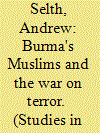

|
|
|
|
|
| Publication |
Mar-Apr 2004.
|
| Summary/Abstract |
Burma's importance in world affairs has long derived from its critical geostrategic position, but another factor now attracting the interest of Western scholars and officials is Burma's large Muslim population. Usually overlooked in surveys of Islam in the Asia-Pacific region, Burma's Muslims are now being accorded greater attention. This is partly because of the harsh treatment they are receiving at the hands of the country's military government, known since 1997 as the State Peace and Development Council (SPDC). It is also due, however, to their growing international connections, which in one case at least includes links to pan-Islamic extremist groups. In this regard, the global war against terrorism has become both a burden and an opportunity for the Rangoon regime
|
|
|
|
|
|
|
|
|
|
|
|
|
|
|
|
| 2 |
ID:
080017


|
|
|
|
|
| Publication |
2007.
|
| Summary/Abstract |
Europe's reactions to its recently-constituted Muslim communities reflect its implicit self-image of cultural homogeneity, despite a long tradition of cultural adaption. This, in turn, is a facet of the persistance of an Orientalist vision which stimulates its opposed mirror-image, Occidentalism or Orientalism-in-reverse, as those communities react with a sense of profound alienation. The two interact to generate the cultural and political confrontation that typifies inter-communal relations today, constructing a new inter-communal socio-political boundary that could harden into a permanent divide of mutual hostility. It is this, far more than globalised salafi-jihadism, that explains the political extremism confronting European states today
|
|
|
|
|
|
|
|
|
|
|
|
|
|
|
|
| 3 |
ID:
112159
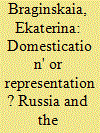

|
|
|
|
|
| Publication |
2012.
|
| Summary/Abstract |
Muslim integration in Russia is traditionally treated as a distinct field of research due to the diverse nature of Muslim communities and particular state approaches to ethnic and religious tolerance. The essay discusses Russia's historic engagement with Islam and suggests that some of its contemporary developments should be examined through a comparison of similar and different attempts to institutionalise Islam in Britain and France. The value of such a comparison lies in better understanding similar challenges to promoting moderate forms of Islam and engaging with Muslim representative institutions within different national contexts. Although the three countries developed different policies for integrating Muslim citizens, there is a degree of convergence in state determination to impose tighter security measures while using more integrationist rhetoric. Russia's engagement with Muslim communities provides an interesting hybrid which is partly reminiscent of Britain's multicultural aspirations and partly of France's drive for regulatory efficiency.
|
|
|
|
|
|
|
|
|
|
|
|
|
|
|
|
| 4 |
ID:
081446


|
|
|
| 5 |
ID:
128128
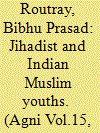

|
|
|
|
|
| Publication |
2013.
|
| Summary/Abstract |
On 23 July 2013, As-Sahab, Al Qaeda's media arm, released the English translation of a video statement in had posted in June 2013 calling upon the Indian Muslims to join the Jihad in Syria. Titled "Why is there no storm in your ocean?", the video featured Mualana Aasim Umar, an Al Qaeda ideologue believed to the based in northwest Pakistan. The 11- page translation of the original video in Urdu, specially exhorted the Muslims of Delhi, Uttar Pradesh, Bihar, Southern India and Gujarat
|
|
|
|
|
|
|
|
|
|
|
|
|
|
|
|
| 6 |
ID:
136293


|
|
|
|
|
| Summary/Abstract |
For a revolution over “culture,” remarkably little has been said about the Cultural Revolution culture itself, and even less about the apolitical, private art produced underground. This article explores this apolitical, private art, arguing that it was a “rebellion of the heart” against the state’s ruthless destruction of the private sphere. Mao’s Party-state drastically fragmented families, moulding socialist subjects through “revolution deep down into the soul.” Paintings of (broken) homes and interiors, flowers, and moonlight articulate lived experiences of the revolution while silently reinventing a private refuge for the body and soul to subsist beyond state control. Defying orthodox revolutionary mass culture, this apolitical art articulated private experience and created a private inner world for a new form of modern subjectivity, while generating community and human solidarity against relentless class struggle and alienation.
|
|
|
|
|
|
|
|
|
|
|
|
|
|
|
|
| 7 |
ID:
110442


|
|
|
|
|
| Publication |
2012.
|
| Summary/Abstract |
In post-Soviet Russia, changing migration patterns have led to the formation of Muslim communities in new regions, and to increased contacts between Russian and foreign Muslims. This article examines two Russian regions, Belgorod Oblast' and the Republic of Adygeya, in which such post-Soviet mobility is causing political conflicts over the governance and rights of Muslim communities. In Belgorod, regional authorities have blocked construction of a mosque for a new Muslim community. In Adygeya, authorities are seeking to restrict foreign influences on local Muslims. In both regions, officials still operate on the outdated Soviet assumption that they can contain the mobility of Islam.
|
|
|
|
|
|
|
|
|
|
|
|
|
|
|
|
| 8 |
ID:
188967


|
|
|
|
|
| Summary/Abstract |
This study focuses on the phenomenon that arose from the involvement of the Muslim community in the pela gandong ritual communication on December 2, 2018. Religious symbols were used to celebrate the first Advent held in Immanuel Church, Moluccas Islands, Indonesia. Symbols included chanting the call to prayer, lafadz Rawi barzanji, and the call to worship, singing hymns of praise, and lighting Advent candles. Using qualitative methods and subjective interpretive paradigms with data collected through interviews, observations were made from a phenomenological perspective, especially ritual, social transformation, social identity negotiation, and symbolic interactionism theory. The results showed that the involvement of the Muslim community in communication rituals has beliefs and values as central principles of kindred equivalence and social-community concerns. In addition, implementing cross-religious kinship in the subjective experience impacts proof of self-identity, human kinship, relationship creation, treatment acceptance, and joint worship labels. The last leads to a developed case of civic pluralism in the pre-conflict era that had been shattered by the conflict. It is likely that cross-religious civic pluralism is a necessary precondition for efforts to build theological pluralism. This article contributes to understanding Muslim communities’ subjective experience regarding cross-religious pela gandong ritual communication and encourages further research in this area.
|
|
|
|
|
|
|
|
|
|
|
|
|
|
|
|
| 9 |
ID:
136071
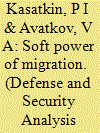

|
|
|
|
|
| Summary/Abstract |
The article studies the range of problems that have emerged due to the growing immigration from Muslim countries into the European Union (EU). While describing the functions of immigrants' communities, the authors focus on their political role in the receiving states. The study of the historical development of government–diaspora relations in three cases (the UK, France, and Germany) shows that Muslim communities' political influence does not reflect their economic and cultural role, which in the future might threaten the EU security, unless these countries develop a new approach to an “acculturation” policy.
|
|
|
|
|
|
|
|
|
|
|
|
|
|
|
|
| 10 |
ID:
169923
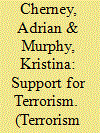

|
|
|
|
|
| Summary/Abstract |
Passive support for terrorism refers to expressions of sympathy for acts of terrorism and/or the justifications (ideology) used by terrorist groups to legitimise their beliefs and actions. One form of passive support is whether Muslims feel terrorists have valid grievances. Appealing to a sense of grievance is a key way that violent Islamists attempt to recruit fellow Muslims to their cause. Using survey data collected from 800 Muslims living in Australia, this paper examines factors that lead Muslims to believe that terrorists have valid grievances. Factors examined include beliefs in jihad and attitudes towards counterterrorism policing and laws. Other variables included in the analysis are social identity, age, gender, income, religious denomination (Sunni vs. Shia), religious commitment, i.e., Mosque attendance, and recent contact with police. The most significant predictor of passive support for terrorism was found to be particular beliefs in jihad. The perceived legitimacy of counterterrorism laws and trust in police were also important. Implications for countering extremist ideology and generating community cooperation in counterterrorism will be considered.
|
|
|
|
|
|
|
|
|
|
|
|
|
|
|
|
|
|
|
|
|